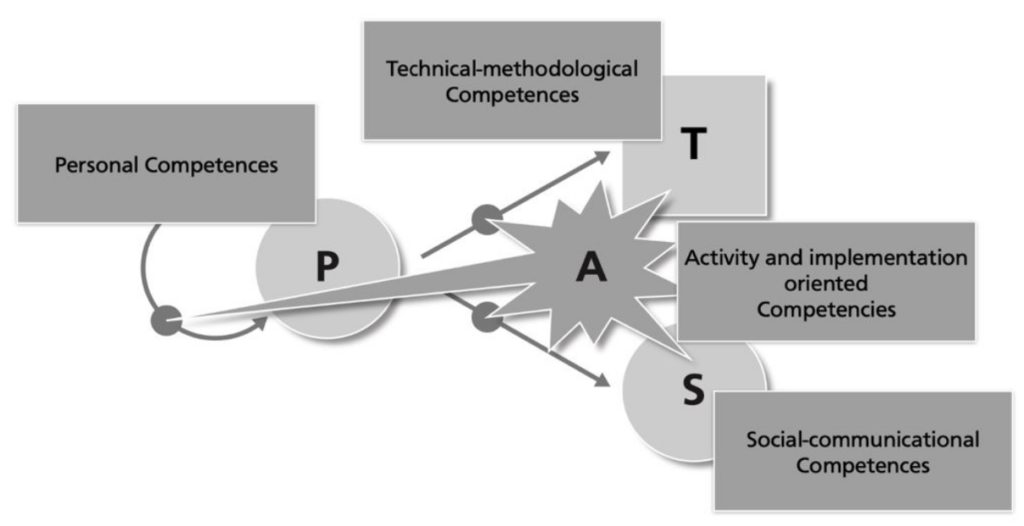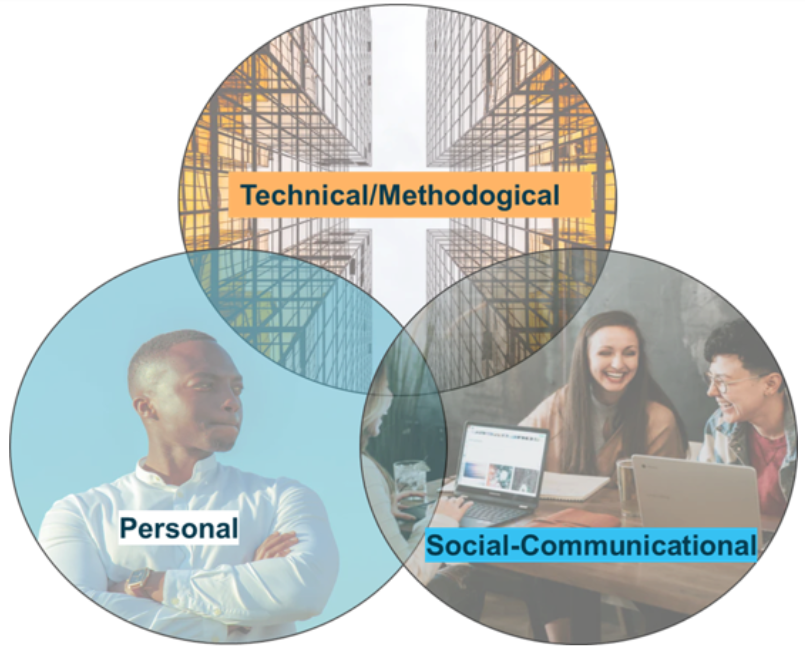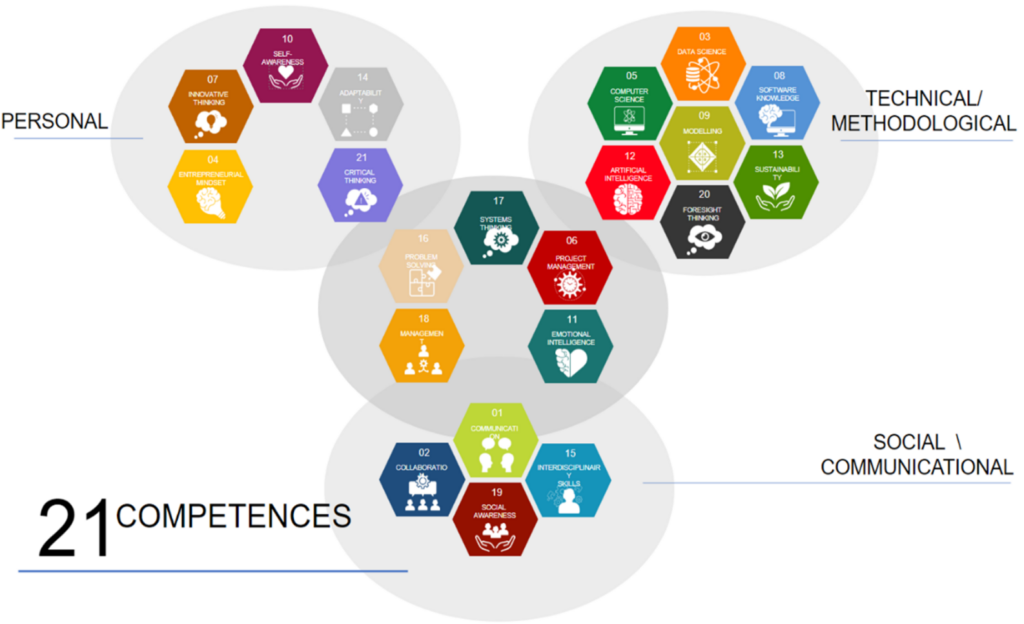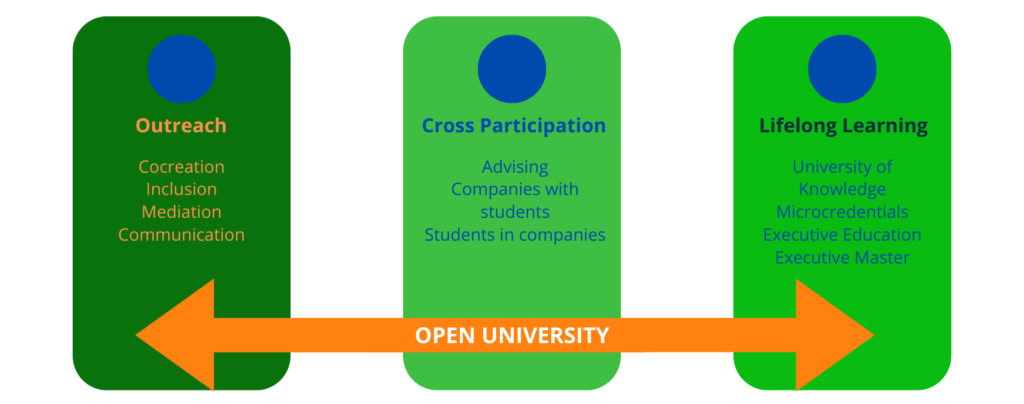Ideate the EuroTeQ Professionals
Table of Contents
21 Future Competences
The process of identifying future competence areas
The goal of the EuroTeQ project is to develop a shared understanding of the future competence areas for societal changes of tomorrow, including the needs of industry partners and research institutions, and to have each of the six partner institutions work actively with their eco systems to continuously review the identified Future Competences to ensure they stay up to date and relevant to both students, professionals, industry, and society.
To obtain a complete overview and as full an extent as possible of the most important future competences in the field of engineering, a broad selection of stakeholders including the projects own local advisory board members, university representatives and ecosystem members from different industries have been involved in the work to identify these present 21 future competences.
A wide variety of activities have been conducted to identify and select the most important future competences such as live workshops, surveys, an online session, and in-depth interviews ensuring a rich and iterated process with input from many stakeholders.
Defining the competence areas of the future is an iterative process, and one that must be followed up on a continuous basis to make sure that they are updated and relevant. It is not simply a one-time gathering of information, it is rather an evolving process, which must include input and perspectives from a variety of industries, professional fields, and functions to make sure it is valid.
The EuroTeQ Competence Model
The categorization of competences builds on the framework of future competences introduced by Prof. Dr. Daniel Pittich, TUM School of Social Sciences and Technology / Professorship of Technical Education, and distinguishes between three main categories of competences:

T: The technical/methodological skills are related to mastering a specific discipline such as the many different engineering specializations, but also technical skills in mastering IT or digital programs such as coding, budgeting, working on statistics and data collection, BI and/or using a project management, didactical approaches or toolboxes of teachers and facilitators.
S: The social-communicational skills enable you to interact with others in a job more broadly, and as a leader, manager or as a member of a workplace, department, research, or project team more specifically. This comprises competences for communicating both orally and in writing in each context effectively, precisely or in an appropriate way.
P: The personal skills relate only to you and are about your personal ability to function in your job and be able to continuously learn new skills and the ability to self-asses, evaluate or motivate your interactions with superiors, colleagues, or partners.
A: Activity and implementation-oriented competencies related to a person’s inner motivation and willingness to act. This competence is placed in the middle of the framework as it serves as a backdrop for the framework, as it is a requirement for any of the competencies to come into play. However, it is not a skill we can teach at universities therefore not a category we will work with going forward in the EuroTeQ project.
The original model above was then transformed into the more appealing VENN diagram with three circles as you see in the figure below, and for the sake of clarity, we removed the last-mentioned skill “Activity and implementation-oriented competencies”.

How the identified 21 future competences were distributed into the framework
Based on the three categories, the competencies identified by the EuroTeQs ecosystem were distributed as shown in the following figure:

Furthermore, competences, skills and knowledge will continuously evolve depending on how far we look into the future. The vision of the EuroTeQ project covers a period of 5-10 years, but we recommend universities to review the identified 21 future competences identified in this project as often as every two years with the current speed of social and technological development. The local review process should be agreed on locally and align the existing work with the university strategies.
Inspiration for how to share the EuroTeQ Future Competences with both internal and external stakeholders
Marketplace style workshop, where participants can walk around placing their comments with post-it notes and are asked to comment on both the total set of competences of the future, but also on the individual competences.
Participants should be both internal and external stakeholders, and must include the LABs, representatives from alumni communities and the industry.
Proposed titles ‘Competence Café’ or ‘Future Competences for Lifelong Learning’.
The presentation should emphasize the 3 categories of competences of the EuroTeQ framework and should highlight the main findings of the consultations with stakeholders such as “Soft skills, knowledge and competences must be taught as well as hard skills, knowledge, and competences at technical universities today as they form part of the Future proof engineer“.
Have a presenter that is well vested around Industry 4.0, education/Lifelong Learning, and the future competences, so that you have a high-level national authority that colleagues and professionals alike will respect.
The facilitation should ensure that the participants have the opportunity to identify the most important future competences related to Lifelong Learning.
The final product could be a physical “Tree of Future Competences” that each of the six universities can produce in the way they want, and place at central places at the universities for exposure together with other strategic messages from the EuroTeQ project.
How do we define a competence:
Competency is the capability to apply or use a set of related knowledge, skills, and abilities required to successfully perform “critical work functions” or tasks in a defined work setting (www.dmp.wa.gov.au)
To validate the EuroTeQ Competence Model and the 21 Future Competences identified, we compared it with selected similar international work. The following sources were considered:
1: The World Economic Forum (WEF) – 21st Century Skills and Top 10 Skills: The EuroTeQ Competence Model was compared to the World Economic Forum’s understanding of “The 21st Century Skills” and the “Top 10 Skills” as outlined in their annual The Future of Jobs Report. This comparison ensured alignment with widely recognized skills and competencies relevant to the evolving job market.
Link: The Future of Jobs Report 2023 | World Economic Forum (weforum.org)
2: The OECD Learning Compass 2030: The EuroTeQ competence model was asserted in relation to the OECD Learning Compass 2030. This indicates a focus on global educational standards set by the Organization for Economic Co-operation and Development, which often serve as reference points for educational policies and practices.
Link: OECD.org/education/2030
3: Center for Curriculum Redesign (CCR) Framework and Essential qualities of character: In relation to the OECD Learning Compass 2030, CCR’s insight and framework on four-dimensional education provided us with a valuable understanding of the competencies, skills and knowledge described by authors Charles Fadel, Maya Bialik, Bernie Trilling in “Four-dimensional education – the competences learners need to succeed in the 21st Century (2015)”.
Link: Four-Dimensional Education | Center for Curriculum Redesign
4: The DELTA Model: The EuroTeQ model was also examined in relation to the competence model and understanding by McKinsey & Co’s “DELTA Model”. This model describes a distinct element of talent, which is close to the EuroTeQ Competence Model.
Link: mckinsey.com/defining-the-skills-citizens-will-need-in-the-future-world-of-work
5: The Association of Nordic Engineers wrote a report focused on competences for a sustainable future in September 2022 and they recommend collaboration across universities to «allow for a greater talent and knowledge flow between countries».
Link: https://nordicengineers-ane-report-competencies-web.pdf
Links for further descriptions:
ESCO Skills & Competences, link: https://esco.ec.europa.eu/en/classification/skill_main
The Human Skills Matrix, link: https://www.jwel.mit.edu/work/posts/human-skills-matrix
The Boudreault model, 2002. Source: https://didapro.me/ressources/videos/competence-professionnelle/
The Open University
The Open University is a concept of partnership between universities and stakeholders (NGOs, Municipalities, Public administration, Unions, …), to facilitate and enforce collaborations with one another.
The contents provided are to present, confirm and detail the principles and models for building en environment ideal for research, education and lifelong learning, especially with the contribution of all involved parties (Ecosystem). The focus will be towards lifelong learning, presenting key components of an efficient ecosystem offered within the EuroTeQ project.
General overview of the components
The Open University concept comprises three main components and their sub-components that give EuroTeQ Engineering University a unique role: Outreach, Cross-participation and Lifelong learning.

Outreach
The Open University implementation includes outreach sub-components such as co-creation, inclusion, mediation and communication. These elements play a huge role in the process of building an ecosystem that reaches and collaborates with industry and society stakeholders. Examples of outreach initiatives provided by EuroTeQ partners within sub-components are presented below:
- Co-creation :
Science City Lyngby (DTU), Brainport (TU/e), Industrial Partnerships (DTU)
- Inclusion :
Technology Leaving No One Behind (DTU), Science clubs for reaching new communities (L’X)
- Mediation :
Institut Polytechnique de Paris (IP Paris/L’X), established an interdisciplinary research and teaching Center, is dedicated in facilitating dialog between arts and sciences servicing citizens.
The Think Tank of the Technical University of Munich (TUM) aims to unite people, ideas, approaches and resources in order to contribute to a better future.
- Communication :
It has been clearly established in recent years that any long-term project in energy, health, or transportation, among others, must have a high level of public acceptance, which is why it is necessary to inform the public about related issues. By proceeding such way, it enables to :
Educate the public about the world of research and engineering, establishing EuroTeQ universities as a model in the dissemination of science and engineering,
Demonstrate that our universities can be at the forefront of scientific news,
Display the impact of research on society, providing an inclusive image of research (youth, women, etc.),
Promote excellence
Cross participation
Cross participation is an important aspect of modern engineering universities. It involves advising, enriching the learning environment of students by professionals, bringing added values to the professional world, partnership, and going beyond with EuroTeQ. The impacts of cross participation on the open university are multiple:
- Enhancing the relevance and timeliness of the teaching
- Improving students motivation and global vision
- Contributing to the development of an active pedagogy
- Helping students with their professional development
- Increasing the motivation of employees
- Building an informal but efficient two-way learning path
- Setting the tone for an efficient Lifelong learning system
Lifelong learning
Various lifelong learning program formats have emerged from from the project and are combined to different learning paths.
- University of knowledge :
Oriented towards individuals than a specific learning format, the goal of the university of knowledge is to provide an external educated audience with access to university courses and conferences, whether in-person or virtual. This way, they can expand their knowledge and be more aware of global issues. This learning paths is implemented at Taltech, in fact many different short courses and work closely with high schools to offer mentoring and summer schools on STEM
- Microcredentials :
Microcredentials are certifications that shows the qualification acquired during a short, transparently assessed course or module in-person or online. They are targeted towards specific audience. A microcredential within EuroTeQ should address a certain technological subject as a distinct, targeted learning experience with a defined learning outcome and it should be a meaningful combination of two or more courses.
- Executive Education :
The executive education offers continuing professional development for engineers, executives and technicians in various areas.
They are based on internships that take place within or between companies. Numerous formats are used including lectures, hands on practical work, possibly complemented by visits to factories, test centers, assembly and integration workshops. The programs can range in length from a week to one full year, with a mix of online and in-person sessions.
- Executive Programme :
EuroTeQ Executive Certificate Program is an internationally recognized diploma or certificate giving access to a new range of responsibilities or to a new level of qualification.